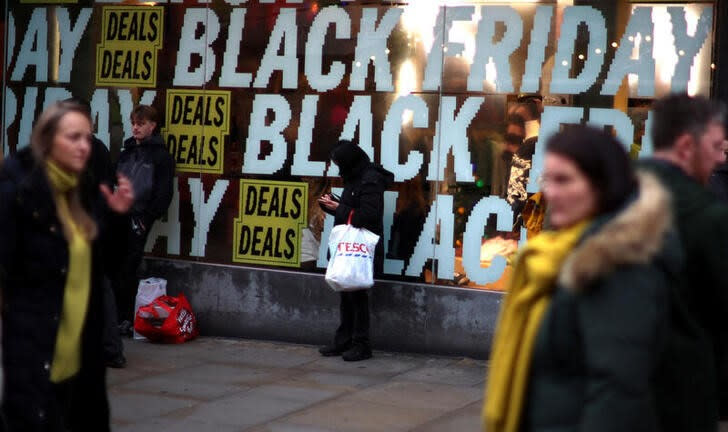World Cup drinkers boost UK GDP, easing recession risk
By David Milliken and Andy Bruce
LONDON (Reuters) -Britain's economy unexpectedly eked out some growth in November after a boost from World Cup drinkers and video game sales, reducing the chance that it has already slipped into recession, but the picture for 2023 remains gloomy.
Gross domestic product rose 0.1% from October, figures from the Office for National Statistics showed on Friday, a higher reading than any forecast in a Reuters poll of economists which had pointed to a 0.2% decline.
The growth surprise means there will need to have been a sharp fall of around 0.5% in output in December for Britain to record two straight quarters of falling GDP, the commonly used definition of recession in Europe.
The world's sixth-biggest economy shrank 0.3% in the three months to the end of September, when output was hit by business closures to mark Queen Elizabeth's funeral.
"With a fair wind, the UK may now avoid recession, though December was marked by widespread strikes and activity survey readings were weak," HSBC economist Liz Martins said.
The broader picture remains subdued. The ONS said economic output in November was 0.3% lower than before the pandemic. In all the other Group of Seven economies output has surpassed pre-pandemic levels.
Consumer price inflation hit a 41-year high of 11.1% in October and living standards are undergoing their biggest squeeze in decades. The government's budget watchdog forecast in November that output would fall by 1.4% in 2023.
"Looking ahead, consumer spending is likely to falter as the squeeze on household real incomes intensifies, so we still expect GDP to contract in the first three quarters of this year," Thomas Pugh, economist at accountants RSM UK, said.
High inflation has led to a wave of strikes by workers in the public sector and rail industry seeking bigger pay rises.
Finance minister Jeremy Hunt said "the most important help we can give is to stick to the plan to halve inflation this year so we get the economy growing again".
The Bank of England forecast in November that inflation would drop to around 5% by the end of this year. Investors expect the BoE to raise interest rates to 4% from 3.5% on Feb. 2 as it seeks to stamp out underlying inflation pressures.
WORLD CUP LIFTS PUB SPENDING
Britain's large services sector was the best-performing part of the economy in November, with output up 0.2% on the month despite widespread rail and postal strikes.
Much of the gain reflected people going to the pub to watch the men's soccer World Cup - with food and beverage services output jumping 2.2% on the month - as well as early pre-Christmas spending on video games, the ONS said.
Manufacturing output dropped by 0.5%, driven by a drop in pharmaceuticals production which is often volatile.
A seasonal fall-off in COVID-19 vaccinations lowered GDP by 0.2 percentage points in November.
Britain's goods trade deficit widened to 15.6 billion pounds ($19.1 billion) in November, slightly more than the 14.9 billion pounds forecast in the Reuters poll.
Trade with the European Union has been hurt by Brexit though the scale has been hard to judge due to changes in data collection, discrepancies between British and EU data and pandemic effects.
HSBC's Martins said exports had picked up by almost 20% since June, and the latest ONS data showed those to the EU were now 4.5% below pre-pandemic levels, while non-EU exports were 0.4% above their level before the pandemic.
($1 = 0.8173 pounds)
(Reporting by David Milliken and Andy Bruce; editing by Sarah Young, Kate Holton and Conor Humphries)

 Yahoo Finance
Yahoo Finance 

